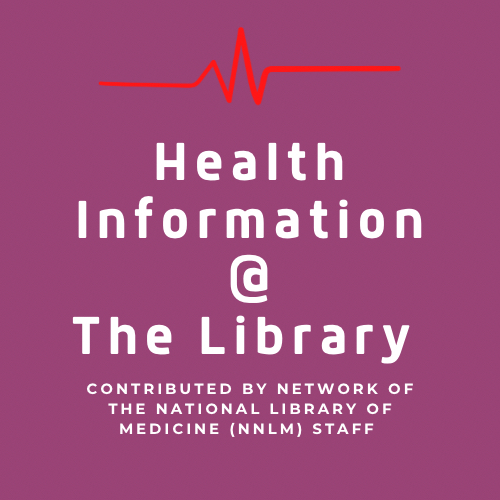Trusted Resources for Assisting Patrons with Health Research

The third core competency of the Medical Library Association’s Consumer Health Information Specialization(CHIS) is “Knowledge of Subject Matter and Resources.” What does this mean? It is important for us to have a solid understanding of specific resources for both general and specialized health topics. This includes being familiar with resources tailored to specific populations or individuals with special needs. It is important to possess knowledge of high-quality web-based resources and to continuously stay updated as these resources evolve or are replaced by new ones.
Resources for Health Topics
Let’s discuss some reliable health websites that library workers can use to support library patrons with health-related questions. These trusted resources provide accurate, evidence-based information on various health topics, including medical conditions, treatments, medications, and wellness tips. They are designed to be user-friendly, offering clear, easy-to-understand content accessible to patrons with varying levels of health literacy. Library workers can use these websites to guide patrons in finding the necessary information, whether for personal health management, understanding medical terminology, or exploring clinical research. By staying familiar with these resources, library staff can confidently assist patrons in navigating the vast amount of online health information.
MedlinePlus is an essential online health resource that offers reliable, easy-to-understand health information in plain language, making it accessible to patients, families, and friends. Offered by the National Library of Medicine (NLM), part of the National Institutes of Health (NIH), MedlinePlus provides trusted, easy-to-understand health and wellness information at no cost. With content available in both English and Spanish, it ensures accessibility for diverse audiences. The site maintains its credibility by remaining free from advertising and refrains from endorsing companies or products. Whether searching for information on health topics, medical tests, human genetics, or even healthy recipes, MedlinePlus delivers authoritative, up-to-date resources you can rely on anytime, anywhere.
Beyond its vast content library, MedlinePlus empowers users with interactive tools and features. With over 22,000 links to authoritative resources in English and 13,000 in Spanish, the platform connects users to high-quality health information selected through rigorous criteria. MedlinePlus supports health educators and librarians through specialized training courses, like “MedlinePlus for Librarians and Health Educators” and “Getting the Right Information to Patients Using MedlinePlus Connect,” equipping professionals to utilize this resource effectively.
PubMed is a free, user-friendly database offering over 36 million citations from biomedical and life sciences literature. Developed by the National Center for Biotechnology Information (NCBI) and maintained by NLM, PubMed connects users to research from over 5,200 journals in about 40 languages. While designed for healthcare professionals and researchers, it’s freely accessible to anyone online, with many citations linking to full-text articles.
 Librarians can leverage PubMed’s powerful search features to locate articles by topic, author, or journal and stay updated on the latest treatments for diseases or disorders. Users can save searches, set email alerts, and explore the database for reliable, comprehensive information. PubMed is essential for supporting evidence-based learning and research in your community. To learn more about the basics of PubMed, take the class PubMed Essentials (On-Demand).
Librarians can leverage PubMed’s powerful search features to locate articles by topic, author, or journal and stay updated on the latest treatments for diseases or disorders. Users can save searches, set email alerts, and explore the database for reliable, comprehensive information. PubMed is essential for supporting evidence-based learning and research in your community. To learn more about the basics of PubMed, take the class PubMed Essentials (On-Demand).
ClinicalTrials.gov is a free database offering detailed information about clinical research studies and their results. Since 2000, the site has allowed users to search studies by topic, location, or condition and review summarized results. A 2023 update improved mobile accessibility and made information clearer for all users. This resource is invaluable for librarians assisting patrons with health research. It provides tools for browsing studies, understanding clinical research processes, and accessing downloadable data for analysis. Researchers can manage study records via the Protocol Registration and Results System (PRS), making ClinicalTrials.gov a key resource for supporting public health and evidence-based learning. To learn more about ClinicalTrials.gov, take the class ClinicalTrials.gov for Librarians.
The NLM offers extensive drug and chemical information, making it an invaluable resource for librarians supporting health research. DailyMed and PubChem are excellent starting points for consumer health questions. MedlinePlus Drugs, Herbs, and Supplements provides plain language information on over 1,500 prescription and over-the-counter medications, as evidence-based articles on herbs and supplements, making it ideal for patients, providers, and caregivers. DailyMed delivers the latest FDA-approved drug labeling in an easy-to-read format, covering prescription and nonprescription drugs, medical gases, dietary supplements, and more. PubChem is a comprehensive reference for in-depth chemical information, containing data on chemical structures, health effects, patents, and safety. To explore these and other NLM drug resources, consider taking the “Drug and Chemical Information” class to deepen your understanding of the information available.
Stay Informed
Staying up to date with new resources can be a challenge for library workers, but the NLM offers several tools to make it easier. The NLM Technical Bulletin is the go-to source for updated NLM product and service updates for those interested in molecular biology and NCBI resources; subscribing to NCBI Announcements ensures you won’t miss important news. The NIH MedlinePlus Magazine also provides free digital publications with the latest health information, making it an excellent resource for library workers to share with their communities. Utilizing these alerts can help you stay informed and provide the most current resources to patrons.
If you want to know more ways to understand the health consumer, then please consider taking our CHIS classes. Hopefully, this blog post helped unpack the core competency “Knowledge of Subject Matter and Resources.”This column highlighted some of the content covered in module three of our NNLM course CHIS on Demand, which is asynchronous, so you can take eight independent one-hour learning modules that cover the basics of providing consumer health information in libraries. You can earn up to 8 hours of continuing education credit applicable toward CHIS Levels 1 and 2. This course will cover all eight core competencies required for Level 1 and 2 certifications.
Tags: Consumerhealth, MLA, NNLM









